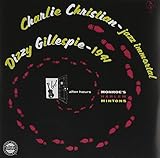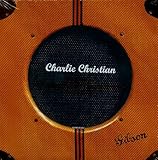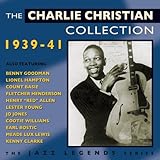SWING TO BOP (1941) by Charlie Christian
STOMPIN' AT THE SAVOY (1941) - Charlie Christian live in small club
Blues in B / Charlie Christian(1916-1942)
Charlie Christian - Waiting For Benny
Charlie Christian - Benny Goodman 1940 ~ Breakfast Feud w/ 2 False Starts
BB King - Guitar Lesson - Influences - Jazz - Charlie Christian:Django Reinhardt
Benny's Bugle - Charlie Christian - Guitar Lesson
ジャズギター初級編 グランドスラム チャーリークリスチャン
Charlie Christian
Charles Henry "Charlie" Christian (July 29, 1916 – March 2, 1942)
Gibson ES-150
Christian's solos are frequently referred to as horn-like, and in that sense he was more influenced by horn players such as Lester Young and Herschel Evans than by early acoustic guitarists like Eddie Lang and jazz/bluesman Lonnie Johnson, although they both had contributed to the expansion of the guitar's role from "rhythm section" instrument to a solo instrument. Christian admitted he wanted his guitar to sound like a tenor saxophone. French gypsy jazz guitarist Django Reinhardt had little influence on Christian, but he was obviously familiar with some of his recordings.Guitarist Mary Osborne recalled hearing him play Django's solo on "St. Louis Blues" note for note, but then following it with his own ideas. By 1939 there had already been electric guitar soloists—Leonard Ware, George Barnes, trombonist/composer ("Topsy") Eddie Durham had recorded with Count Basie's Kansas City Six, Floyd Smith recorded "Floyd's Guitar Blues" with Andy Kirk in March 1939, using an amplified lap steel guitar, and Texas Swing pioneer Eldon Shamblin was using amplified electric guitar with Bob Wills.
Guitarists who followed Christian and who were influenced by him include Oscar Moore (Nat King Cole trio), Les Paul, Tiny Grimes, Barney Kessel, George Benson, Herb Ellis, Jimmy Raney, Tal Farlow, Kenny Burrell, Grant Green, Wes Montgomery, and Jim Hall. Tiny Grimes, who made several records with Art Tatum, can often be heard quoting Christian note-for-note.
Christian paved the way for the modern electric guitar sound that was followed by other pioneers, including T-Bone Walker, Eddie Cochran, Cliff Gallup, Scotty Moore, Franny Beecher, B.B. King, Chuck Berry, Carlos Santana and Jimi Hendrix. For this reason Christian was inducted in 1990 into the Rock and Roll Hall of Fame as an "Early Influence".
Christian's exposure was so great in the brief period he played with Goodman that he influenced not only guitarists, but other musicians as well. The influence he had on "Dizzy" Gillespie, Charlie Parker, Thelonious Monk and Don Byas can be heard on their early "bop" recordings "Blue'n Boogie" and "Salt Peanuts". Other musicians, such as trumpeter Miles Davis, cite Christian as an early influence. Indeed, Christian's "new" sound influenced jazz as a whole. He reigned supreme in the jazz guitar polls up to two years after his death
Bebop and Minton's Playhouse
Charlie Christian was an important contributor to the music that became known as "bop" or "Bebop". Private recordings made in September 1939 in Minneapolis, Minnesota by Goodman aficionado Jerry Newhouse capture the newly hired Christian while on the road with Goodman and feature Goodman tenor sax man Jerry Jerome and then local bass man Oscar Pettiford. Taking multiple solos, Christian shows much the same improvisational skills later captured on the Minton's and Monroe's recordings in 1941, suggesting that he had already matured as a musician.The Minneapolis recordings include Stardust, Tea for Two, and I've Got Rhythm, the latter a favorite piece of bop composers and jammers.
More of the unrestrained Christian is apparent in recordings of the partial Goodman Sextet made in March 1941. With Goodman and bassist Artie Bernstein absent, Christian and the rest of the Sextet recorded for nearly 20 minutes as the engineers tested equipment. Two recordings were released from that session years later: Blues in B and Waiting for Benny, which showed hints of bop jam sessions. The free flow of these sessions contrasts with the more formal swing music recorded after Goodman had arrived at the studio. Other Goodman Sextet records that foretell bop are Seven Come Eleven (1939) and Air Mail Special (1940 and 1941).
An even more striking example is a series of recordings made at Minton's Playhouse, an after-hours club located in the Hotel Cecil at 210 West 118th Street in Harlem by Columbia student Jerry Newman on a portable disk recorder in 1941. Newman captured Christian, accompanied by Joe Guy on trumpet, Kenny Kersey on piano and Kenny Clarke on drums,stretching out far beyond what the confines of the 78 RPM record would allow. His work on Swing to Bop, a later Esoteric Records company re-title of Eddie Durham's Topsy, is an example of what Christian was capable of creating "off the cuff."
His use of tension and release, a technique employed by Lester Young, Count Basie[20] and later bop musicians, is also present on "Stompin' at the Savoy", included among the Newman recordings. The collection also includes recordings made at Clark Monroe's Uptown House, another late-night jazz haunt in the Harlem of 1941 that include Oran "Hot Lips" Page. Other recordings include tenor sax man Don Byas. The Minton's recordings were long rumored to feature "Dizzy" Gillespie and Thelonious Monk, but that has since been proven untrue, although both were regulars at the jam sessions, with Monk a regular in the Minton's house band.
Kenny Clarke claimed that Epistrophy and Rhythm-a-Ning were Charlie Christian compositions that Christian played with Clarke and Thelonious Monk at Minton's jam sessions. The Rhythm-a-ning line is heard on Down on Teddy's Hill, and behind the introduction on Guy's Got To Go from the Newman recordings, but it is also a line from Mary Lou Williams' Walkin' and Swingin'.
Clarke said Christian first showed him the chords to Epistrophy on a ukulele. These recordings have been packaged under a number of different titles, including After Hours and The Immortal Charlie Christian. While the recording quality of many of these sessions is poor, they show Christian stretching out much longer than he could on the Benny Goodman sides. On the Minton's and Monroe's recordings, Christian can be heard taking multiple choruses on a single tune, playing long stretches of melodic ideas with ease.
Christian was just as adept with understatement as well. His work on the Goodman sextet sides Soft Winds, Till Tom Special, and A Smo-o-o-oth One, show his use of very few, well placed melodic notes. His work on the Sextet's recordings of ballads Stardust, Memories of You, Poor Butterfly, I Surrender Dear and On the Alamo as well as his work on Profoundly Blue with the Edmond Hall Celeste Quartet (1941) show hints of what was later called cool jazz. Although credited for very few, Christian composed many of the original tunes recorded by the Benny Goodman Sextet.
 After Hoursクリエーター情報なしOjc
After Hoursクリエーター情報なしOjcチャーリー・クリスチャン(guitar)
セロニアス・モンク(piano)
ディジー・ガレスビー(trumpet)
ケニー・クラーク(drums)
ドン・バイアス(tenner sax)
ジョー・ガイ(trumpet)
1.Swing To Bop
2.Stompin' At The Savoy
3.Up On Teddy's Hill
4.Down On Teddy's Hill
5.Guy's Got To Go
6.Lips Flips
7.Stardust #1
8.Kerouac
9.Stardust #2
1941年ミントハウスのチャーリー・クリスチャンのスゥイング
 Original Guitar Heroクリエーター情報なしSbme Special Mkts.
Original Guitar Heroクリエーター情報なしSbme Special Mkts.出し惜しみチャーリー・クリスチャンのザ・オリジナル・ギター・ヒーロー
 Genius of Electric Guitarクリエーター情報なしSony Legacy
Genius of Electric Guitarクリエーター情報なしSony LegacyDISC1
1. Flying Home
2. Rose Room
3. Stardust
4. Memories Of You
5. Soft Winds
6. Seven Come Eleven
7. Shivers
8. AC/DC Current
9. I'm Confessin' (That I Love You)
10. Till Tom Special
11. Gone With What Wind
12. The Sheik Of Araby
13. Untitled Tune
14. Poor Butterfly
15. I Surrender, Dear
16. Boy Meets Goy (Grand Slam)
17. These Foolish Things
18. Flying Home
19. Memories Of You
20. Soft Winds
21. Shivers
22. Gone With What Wind
23. The Sheik Of Araby
24. I Surrender, Dear
25. Boy Meets Goy (Grand Slam)
26. These Foolish Things
DISC2
1. Six Appeal (My Daddy Rocks Me)
2. Good Enough To Keep (Air Mail Special)
3. Ad Lib Blues
4. Wholly Cats
5. Charlie's Dream
6. I Never Knew
7. Lester's Dream
8. Wholly Cats
9. Wholly Cats
10. Royal Garden Blues
11. As Long As I Live
12. Benny's Bugle
13. Gilly
14. Six Appeal (My Daddy Rocks Me)
15. Six Appeal (My Daddy Rocks Me)
16. Six Appeal (My Daddy Rocks Me)
17. Good Enough To Keep (Air Mail Special)
18. Good Enough To Keep (Air Mail Special)
19. Wholly Cats
20. Wholly Cats
21. Wholly Cats
22. Royal Garden Blues
23. Royal Garden Blues
24. As Long As I Live
25. Gilly
26. Gilly
DISC3
1. Breakfast Feud
2. I Can't Give You Anything But Love
3. Breakfast Feud
4. On The Alamo
5. I Found A New Baby
6. Gone With What Draft
7. A Smo-o-o-oth One
8. Air Mail Special (Good Enough To Keep)
9. Breakfast Feud
10. Breakfast Feud
11. Breakfast Feud
12. Breakfast Feud
13. I Can't Give You Anything But Love
14. I Can't Give You Anything But Love
15. Breakfast Feud
16. Breakfast Feud
17. Breakfast Feud
18. I Found A New Baby
19. Gone With What Draft
20. Gone With What Draft
21. A Smo-o-o-oth One
22. A Smo-o-o-oth One
23. Air Mail Special (Good Enough To Keep)
DISC4
1. All Star Strut
2. Honeysuckle Rose
3. Li'l Boy Love
4. Solo Flight
5. All Star Strut
6. Li'l Boy Love
7. Solo Flight
8. Untitled Tune
9. Poor Butterfly
10. I Surrender, Dear
11. I Surrender, Dear
12. Six Appeal (My Daddy Rocks Me)
13. Six Appeal (My Daddy Rocks Me)
14. These Foolish Things
15. Tune Up & Blues
16. Wholly Cats
17. Breakfast Feud
18. Breakfast Feud
19. Gilly
20. All Star Strut
21. Benny's Bugle
22. Benny's Bugle
23. March 13, 1941 Jam Session
 Charlie Christian Collection 1939-41クリエーター情報なしFabulous
Charlie Christian Collection 1939-41クリエーター情報なしFabulous